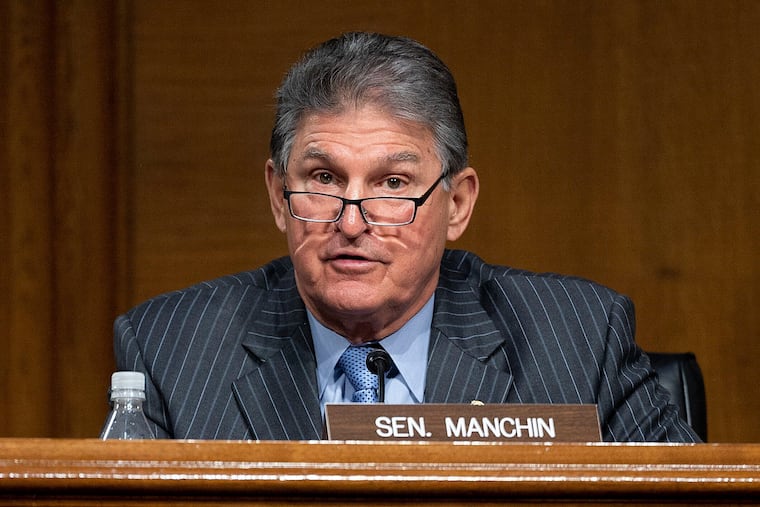Democrat Joe Manchin won’t vote to abolish the Senate filibuster, dealing a blow to Biden’s agenda
His position as the most conservative Democrat in an evenly divided Senate has given him an outsized role.

WASHINGTON — Democratic Sen. Joe Manchin III said Wednesday that under no circumstances would he vote to eliminate or weaken the legislative filibuster in his most definitive statement yet on the topic, dealing a blow to Democrats’ hopes of pushing major aspects of President Joe Biden’s agenda through Congress.
The West Virginia senator also suggested in an op-ed published in The Washington Post that he would be opposed to using the budget reconciliation process, under which certain legislation requires only a majority vote, again to circumvent the filibuster, an avenue Senate Democrats have considered for passing Biden’s ambitious infrastructure package.
“There is no circumstance in which I will vote to eliminate or weaken the filibuster,” Manchin wrote. “The time has come to end these political games, and to usher a new era of bipartisanship where we find common ground on the major policy debates facing our nation.”
Even with all 50 Democrats in agreement, most legislation requires 60 votes to stop a filibuster. Democrats argue that while the filibuster used to be employed sparingly, it’s now used to stymie any issue where there is partisan disagreement.
A few weeks ago, Manchin flirted with being open to talks about changes to the filibuster, but as ideas were floated, such as forcing senators to stay on the Senate floor talking while blocking legislation, he batted each one down.
“Every time the Senate voted to weaken the filibuster in the past decade, the political dysfunction and gridlock have grown more severe,” he wrote Wednesday. “The political games playing out in the halls of Congress only fuel the hateful rhetoric and violence we see across our country right now. The truth is, my Democratic friends do not have all the answers and my Republican friends do not, either. This has always been the case.”
As the most conservative Senate Democrat, Manchin has an outsized role in an evenly-divided Senate where, absent Republican support, Democrats need Manchin to get anything passed. Another conservative Democrat, Kyrsten Sinema of Arizona, has also said she is opposed to getting rid of the filibuster.
Momentum for scrapping or amending the filibuster has been building in recent months with senators who once opposed jettisoning of the Senate rule now saying it is time to scrap what former president Obama has called a “Jim Crow relic.” Biden, who long defended the filibuster, has also come out in support of changes to it, saying it’s “being abused in a gigantic way.”
Much of the current attention regarding changing Senate rules is on sweeping legislation to overhaul the nation’s voting laws that Democrats have portrayed as a way to fight voter suppression and make it easier for to cast a ballot. But Republicans have called it a power grab and there is little chance at the moment for bipartisan agreement on voting changes.
In his op-ed, Manchin made clear he does not agree with some of his colleagues that it is worth getting rid of the filibuster to enact new voting laws.
“Our ultimate goal should be to restore bipartisan faith in our voting process by assuring all Americans that their votes will be counted, secured and protected,” he wrote.
Democrats used the budget reconciliation process to pass Biden’s $1.9 trillion COVID-19 relief bill, which Manchin supported, and are viewing it as a vehicle for additional spending and tax proposals on a range of issues. But Manchin threw cold water on this idea in his op-ed, although the was not definitive about whether he would support its use again this year.
“We should all be alarmed at how the budget reconciliation process is being used by both parties to stifle debate around the major issues facing our country today. Legislating was never supposed to be easy,” he wrote, adding: “I simply do not believe budget reconciliation should replace regular order in the Senate.”